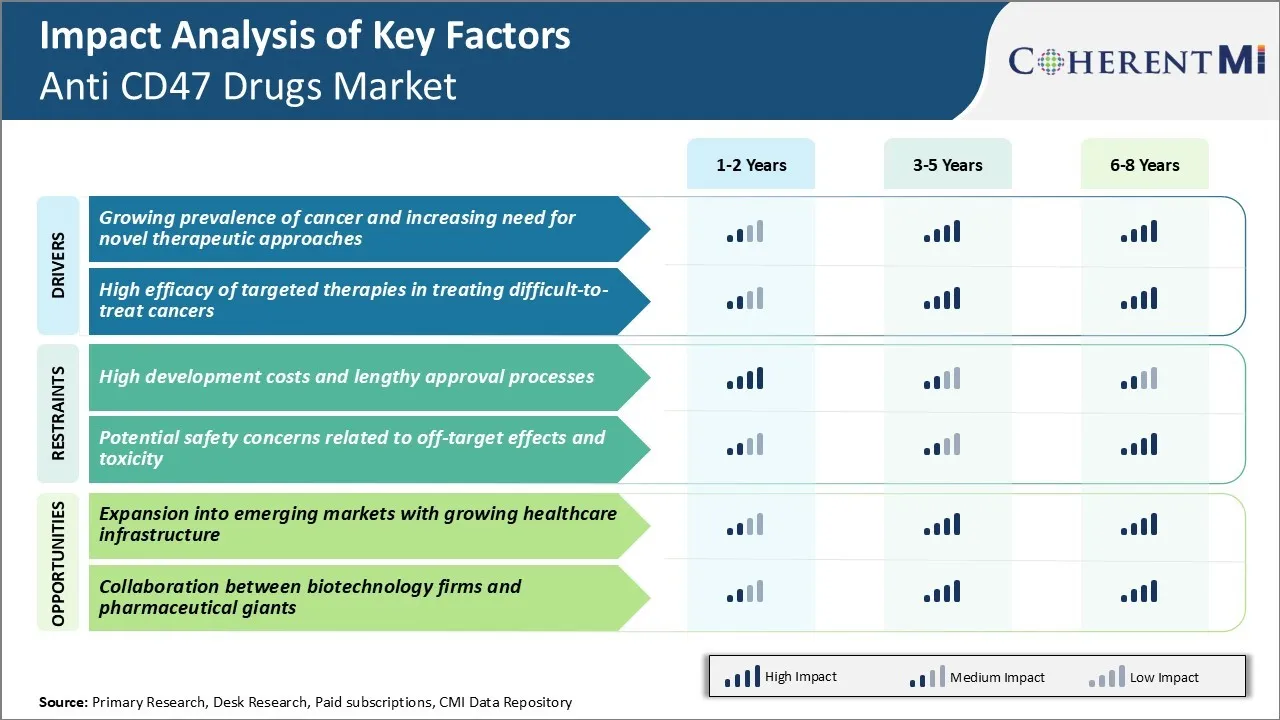Anti CD47 Drugs Market Trends
Market Driver - Growing prevalence of cancer and increasing need for novel therapeutic approaches
Cancer has become one of the leading causes of mortality worldwide. As per latest estimates by WHO, the global burden of cancer is expected to rise significantly in the coming years due to rapidly aging population and changing lifestyle habits. It is estimated that over 70% increase in new cancer cases would be witnessed globally by the end of next decade. This further substantiates the fact that conventional treatment approaches such as chemotherapy, radiation and surgery are proving to be inadequate in fully curing cancer or significantly improving survival rates of patients.
While significant progress has been made in developing targeted therapies for certain cancers, majority of cancers still remain difficult-to-treat. For such difficult-to-treat cancers, oncologists are increasingly getting interested in further exploring novel mechanisms and pathways which can potentially be targeted for developing more effective anti-cancer drugs. One such novel target which has gained significant research focus globally is CD47 pathway. CD47 acts as a "don't eat me" signal which protects cancer cells from phagocytosis by the immune system. Early clinical studies have shown anti-CD47 drugs can help trigger an immune response against cancer cells and has potential to treat various blood cancers and solid tumors.
Given the projected rise in cancer burden worldwide and limitations of existing treatment approaches, there is a growing need for therapies which have novel mechanisms of action and can potentially treat difficult-to-treat cancers. CD47 is emerging as an important evasion pathway which when blocked can help unleash the immune system against cancers. Subject to positive results from ongoing clinical trials, anti-CD47 drugs are well-positioned to benefit large patient pool suffering from cancers with poor prognosis. This growing need for alternative treatment strategies makes CD47 pathway an important target for further clinical development and commercialization of novel anti-cancer drugs.
Market Driver - High efficacy of targeted therapies in treating difficult-to-treat cancers
Survival rates for many cancers have improved significantly over last few decades mainly due to advancements in early detection and targeted cancer therapies. However, there still exist subsets of cancers which remain difficult-to-treat even with existing treatment modalities and tend to have poor prognosis. These include tumors like triple negative breast cancer, acute myeloid leukemia, advanced gastric and liver cancers etc. For such difficult-to-treat cancers, a major unmet need exists for developing targeted therapies which can help achieve much higher response rates and long-term disease control.
Early phase trials have shown anti-CD47 drugs can induce robust anti-tumor activity both as monotherapy and in combination with other immune therapies across several cancers including hematological and solid malignancies. For instance, in AML trials anti-CD47 drug hu5F9-G4 achieved complete remission in nearly 40% of relapsed/refractory patients when combined with azacitidine or venetoclax.
Given the high unmet need for better treatment options for difficult-to-treat cancers, therapies which demonstrate ability to achieve high efficacy endpoints would provide significantly superior treatment outcome to existing standards of care. The encouraging efficacy signals shown so far position anti-CD47 drugs as a promising targeted approach to help address this unmet need and substantially improve survival prospects of poor prognosis cancer patients worldwide. Subject to confirmation in ongoing late phase studies, anti-CD47 therapy has potential to emerge as a front-line or adjunct treatment option for various difficult-to-treat cancers.

Market Challenge - High development costs and lengthy approval processes
One of the major challenges faced by companies operating in the anti-CD47 drugs market is the high development costs associated with bringing a new drug to the market and obtaining regulatory approval. Developing a novel drug molecule requires huge investments in research and clinical trials over many years. Anti-CD47 drugs, being a new class of immunotherapy, have an unproven safety and efficacy profile which means extensive research is required to demonstrate their value to patients and healthcare systems. Clinical trials involving human participants need to go through multiple phases to evaluate factors such as optimum dosage, side effects, and overall impact on disease outcomes. Obtaining regulatory approval from bodies like the FDA involves submission of vast amounts of clinical and non-clinical data which takes significant time and resources to compile. Additionally, failure or delays in any stage of development can negatively impact costs and timelines. The high costs and risks involved act as a deterrent for many pharmaceutical companies, especially smaller ones, from actively investing in this promising segment.
Market Opportunity - Expansion into emerging markets with growing healthcare infrastructure
One of the major opportunities for companies in the anti-CD47 drugs market is the potential for expansion into emerging markets which are seeing significant growth in their healthcare infrastructure and spending capabilities. Many developing countries in Asia, Latin America, Middle East and Africa are increasingly able to afford advanced treatment options. Their populations are large with growing disease burdens that could benefit from innovative immunotherapies like anti-CD47 drugs. However, these markets currently have limited access and awareness about such novel treatments. Companies who are able to conduct relevant local clinical research, obtain regulatory approvals, set up distribution networks and educate healthcare providers stand to tap into huge unmet needs in emerging territories. Successfully entering emerging healthcare domains early allows brands to gain first-mover advantage and brand loyalty. It also opens up new revenue streams that can boost overall market valuation.